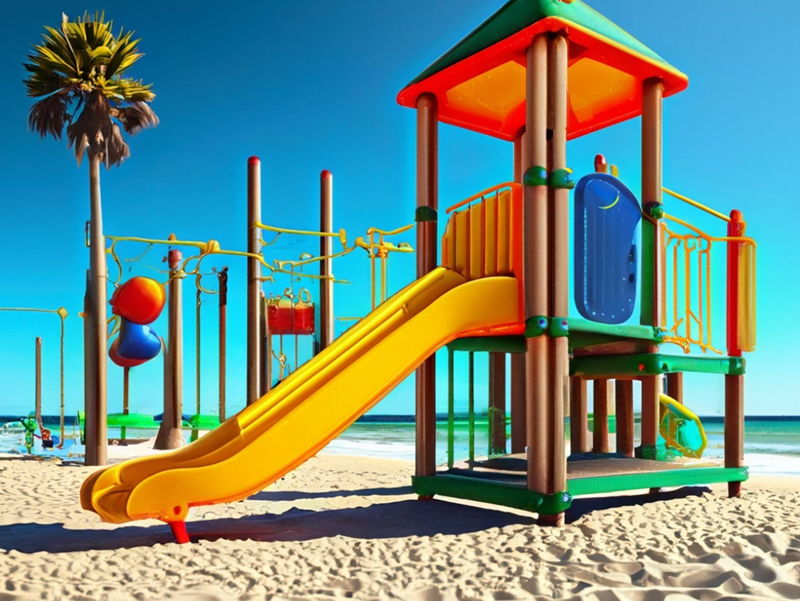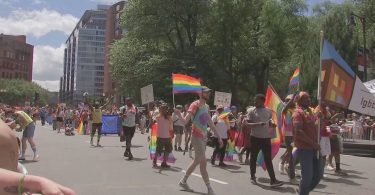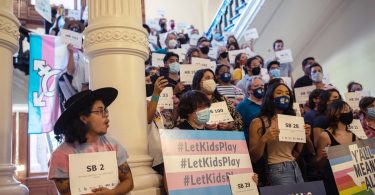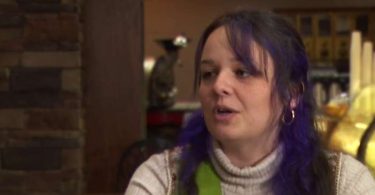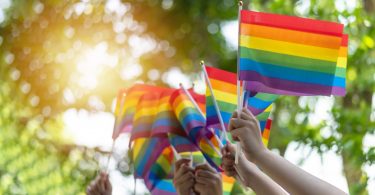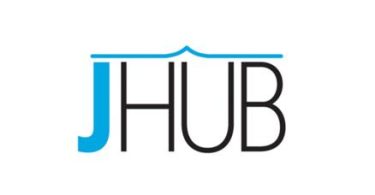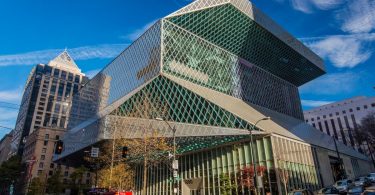Playground on a beach – Created with Adobe AI
The city of Seattle decided not to move forward with a plan to use money from an anonymous donor to build a playground for children at an unofficial nude beach popular with members of the LGBTQ community.
Seattle Parks and Recreation officials had floated the idea to build a playground at Denny Blaine Park, which abuts Lake Washington, a freshwater lake located to the east of downtown Seattle. The plan, which carried a price tag of $550,000, was the brainchild of an anonymous donor, and was marketed as a way to “change the way space on Lake Washington has been used,” reports the Seattle Times.
Members of the LGBTQ community have said that Denny Blaine Park has been a safe haven for them for decades.
Hundreds of people packed a public meeting last month, filling Seattle’s MLK FAME Community Center beyond capacity, with no attendees speaking in support of the plan. More than 8,500 people signed their names to an online petition opposing the project, and activists used social media as an organizing tool.
Many community members speculated that there was an ulterior motive behind the donor’s request: shutting down the nude beach and, at the same time, eliminating a popular LGBTQ gathering spot.
Andy Sheffer, the deputy superintendent of operations at the city’s Parks and Recreation department, pitched the privately-funded project as a chance to build a playground for children in a neighborhood that doesn’t have a play area within a 10- to 15-minute walk, and to complete the project without spending taxpayer dollars.
“The intent of this project is absolutely not to target any community members,” Sheffer said as he was assailed with boos and catcalls. One person yelled, “No one believes it!”
Some community members were also taken aback at the seemingly secretive way the project was pushed forward, with many caught unaware. The campaign against the playground was sparked after someone saw a parks department sign about the project posted at Denny Blaine Park and contacted the Capitol Hill Seattle blog.
Milo Kusold, a 30-year-old resident of Seattle’s Capitol Hill neighborhood and one of the chief opponents of the project, told the Times that they view the playground as a way for anti-LGBTQ forces to play victim by trafficking in “false, negative stereotypes about the queer and trans community” that paint LGBTQ people as perverts or child molesters, and unfairly tag nudists as sexually promiscuous.
“If you have a person who’s not in the community showing up with their kids, and there are people around who are naked, they’re probably going to call the cops,” Kusold said. “This is kind of the weaponization of children to try to exclude or harm the queer community.”
Under Washington State law, public nudity is legal, except in cases when a person knows they’re likely to cause “affront and alarm.” It is prosecutable as a misdemeanor in that case, and as a felony if a person exposes themselves to someone under the age of 14.
While no one at the raucous community meeting spoke in favor of the playground, at least one father told Seattle ABC affiliate KOMO 4 that he wanted to see the project built.
“I just want a place where I can bring my kids and my niece and nephew,” said resident Brad Glaberson.
He added that he had seen an increase in sexual activity inside the park and had hopes that having a playground installed would curb some of that unsavory behavior.
“The lewd behavior — it’s just become an unsavory place for children,” Glaberson said. “We want a park where we can go and feel safe and comfortable with our kids.”
Members of the LGBTQ community were vocal in their opposition, and urged city officials to preserve one of the rare LGBTQ-specific parks in the city.
Vince Reiman, a Black transgender Seattle native, said that Denny Blaine Park is the only park where he feels safe and comfortable in his own skin.
“When I transitioned, I thought that I would never be able to swim in Lake Washington again.… Denny Blaine is my miracle,” Reiman said.
Miguel Lugo, who moved to Seattle eight years ago, said that the semi-secluded beach, and the privacy it permits due to its setup, allowed him to become more comfortable with himself after struggling with body dysmorphia and suicidal ideation. His mental health has since improved after making friends and spending time at the beach.
“Being nude at Denny Blaine quite literally saved my life,” he said.
Other critics noted there were more practical reasons to oppose the playground at Denny Blaine Park. For example, the park has no lifeguards and the proposed playground area can’t be seen from the upper lawn of the park, raising safety concerns for children and parents who wish to keep an eye on them.
“Because of the poor sightlines, it’s a great nude beach but a really bad place for children to play,” Sophie Amity Debs, a 25-year-old resident, argued in her speech at last month’s meeting.
Still others fretted about the park’s proximity to Lake Washington, and the drowning dangers that children could face if they attempt to swim or engage in water sports without professional supervision.
When parks department officials said the playground proposal wasn’t intended to displace the LGBTQ community, Debs said, “I’d love to ask the anonymous donor whether that’s true.”
Ultimately, the parks department decided not to move forward with the project. They are seeking an alternative, although it’s unclear whether the donor will continue to provide funds for a play area at a different location, such as Lakeview Park, which is just 0.4 miles from Denny Blaine Park.

